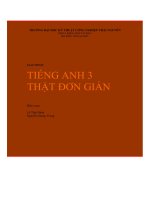Relative clauses hồ quang trung
Bạn đang xem bản rút gọn của tài liệu. Xem và tải ngay bản đầy đủ của tài liệu tại đây (380.05 KB, 36 trang )
Relative Clauses
Hồ Quang Trung
Outline
• Grammar:
Relative Clauses
• Vocabulary: 70 Jobs
• Pronunciation: /θ/ & /ð/
• Speaking: Talk about Your Dreamy Jobs
• Listening: Oah - Alexdander Rybak
Hồ Quang Trung
Grammar
Relative Clauses
Hồ Quang Trung
Relative Pronouns
• A relative pronoun is a pronoun that introduces a relative clause. It is
called a relative pronoun because it relates to the word that its relative
clause modifies.
Example:
• The person who phoned me last night is my teacher.
Hồ Quang Trung
Relative Pronouns <= Đại Từ Quan Hệ
• A relative pronoun is a pronoun that introduces a relative clause. It is
called a relative pronoun because it relates to the word that its relative
clause modifies. Đại khái là những đại từ nào liên quan tới chủ điểm này
thì được gọi là đại từ quan hệ.
Example:
• The person who phoned me last night is my teacher.
Hồ Quang Trung
Relative Pronouns
• There are five relative pronouns: who, whom, whose, which, that*
who (subject) and whom (object) are generally only for people.
whose is for possession.
which is for things.
that can be used for things and people only in defining relative clauses (clauses
that are essential to the sentence and do not simply add extra information).
Hồ Quang Trung
Relative Pronouns
• There are five relative pronouns: who, whom, whose, which, that* Chỉ cần nhớ who/ which
và that là được.
who (subject) and whom (object) are generally only for people.
whose is for possession. Các bạn cứ nhớ Whose car is it? là xong. Trường hợp này khá đặc
biệt. Ngoài việc gắn với Danh Từ, còn lại chả dùng được cho việc gì.
which is for things.
that can be used for things and people only in defining relative clauses (clauses that are
essential to the sentence and do not simply add extra information). Cái này không quan
trọng lắm! Văn nói dùng tất.
Hồ Quang Trung
Relative Pronouns
who
subject or object pronoun for people
I told you about the woman who lives
next door.
which
subject or object pronoun for animals
and things
Do you see the cat which is lying on the
roof?
which
referring to a whole sentence
He couldn’t read which surprised me.
whose
possession for people animals and
things
Do you know the boy whose mother is a
nurse?
Hồ Quang Trung
Relative Pronouns
who
subject or object pronoun for people
I told you about the woman who lives
next door.
which
subject or object pronoun for animals and
things
Do you see the cat which is lying on the
roof?
which
referring to a whole sentence Do đây là bài
ở trình độ Sơ Cấp nên mình không giải thích He couldn’t read which surprised me.
rõ phần này. Hiểu là X which… đi.
possession for people animals and things
Do you know the boy whose mother is
whose Các bạn chỉ cần nhớ từ này đi kèm với Danh
a nurse?
Từ. Rất dễ nhận ra khi làm bài TOEIC.
Hồ Quang Trung
Relative Pronouns
object pronoun for people, especially in
non-defining relative clauses (in defining I was invited by the professor whom I met
whom
relative clauses we colloquially prefer
at the conference.
who)
that
subject or object pronoun for people,
animals and things in defining relative
clauses (who or which are also possible)
Hồ Quang Trung
I don’t like the table that stands in the
kitchen.
Relative Pronouns
object pronoun for people, especially in
non-defining relative clauses (in defining
relative clauses we colloquially prefer
I was invited by the professor whom I met
whom
who) Vì là bài cơ bản nên chỗ này mình
at the conference.
không giải thích kỹ. Sẽ nói trong phần ghi
chú riêng.
that
subject or object pronoun for people,
animals and things in defining relative
clauses (who or which are also possible)
Hồ Quang Trung
I don’t like the table that stands in the
kitchen.
Tables
• S = Subject
• O = Object
• P = Possessive
• Defining là xác định, không bỏ được. Nếu có 3 bà chị thì khi nói về 1 bà ở Mỹ Đình
không thể bỏ cụm My sister who lives in… đi.
• Non-defining là không xác định, bỏ vô tư vì là thông tin thừa. Giống như trong
tiếng Việt mình dùng (…), tiếng Anh dùng (,…,).
Hồ Quang Trung
Defining Relative Clauses
The person who phoned me last night is my teacher.
The person that phoned me last night is my teacher.
that is preferable
S
The car which hit me was yellow.
The car that hit me was yellow.
Hồ Quang Trung
that is preferable
Defining Relative Clauses
The person whom I phoned last night is my teacher.
The people who I phoned last night are my teachers.
whom is correct but formal
O The person that I phoned last night is my teacher.
The person (X) I phoned last night is my teacher.
Hồ Quang Trung
relative pronoun is optional
Defining Relative Clauses
The car which I drive is old.
The car that I drive is old.
O The car (X) I drive is old.
Hồ Quang Trung
that is preferable to which
relative pronoun is optional
Defining Relative Clauses
P
The student whose phone just rang should stand up.
Students whose parents are wealthy pay extra.
The police are looking for the car whose driver was
masked.
P The police are looking for the car of which the driver
was masked.
Hồ Quang Trung
whose can be used with things
of which is also possible
Non-defining Relative Clauses
Mrs. Pratt, who is very kind, is my teacher.
S
The car, which was a taxi, exploded.
The cars, which were taxis, exploded.
Hồ Quang Trung
Non-defining Relative Clauses
Mrs. Pratt, whom I like very much, is my teacher.
whom is correct but formal
O Mrs. Pratt, who I like very much, is my teacher.
who is common in spoken English
and informal written English
O The car, which I was driving at the time, suddenly caught fire.
Hồ Quang Trung
Non-defining Relative Clauses
The car, whose driver jumped out just before the
accident, was completely destroyed.
whose can be used with things
P The car, the driver of which jumped out just
before the accident, was completely destroyed. of which is also possible
P My brother, whose phone you just heard, is a doctor.
Hồ Quang Trung
Notes
• Not all grammar sources count that as a relative pronoun.
• Some people claim that we should not use that for people but must use who/
whom. There is no good reason for such a claim; there is a long history of that for
people in defining relative clauses from Chaucer, Shakespeare and the
Authorized Version of The Bible to Fowler's and Churchill.
Hồ Quang Trung
Game
/>
Hồ Quang Trung
Subject/ Object Pronouns
• If the relative pronoun is followed by a verb, the relative pronoun is a subject
pronoun. Subject pronouns must always be used.
Examples:
The apple which is lying on the table.
Hồ Quang Trung
Subject/ Object Pronouns
• If the relative pronoun is followed by a verb, the relative pronoun is a subject
pronoun. Subject pronouns must always be used.
Examples:
The apple which is lying on the table.
Ở đây which thay thế Subject trong một câu có dạng SVA.
Hồ Quang Trung
Subject/ Object Pronouns
• If the relative pronoun is not followed by a verb (but by a noun or pronoun), the
relative pronoun is an object pronoun. Object pronouns can be dropped in
defining relative clauses, which are then called Contact Clauses.
Examples:
The apple (which) George lay on the table.
Hồ Quang Trung
Subject/ Object Pronouns
• If the relative pronoun is not followed by a verb (but by a noun or pronoun), the relative
pronoun is an object pronoun. Object pronouns can be dropped in defining relative clauses,
which are then called Contact Clauses.
Examples:
The apple (which) George lay on the table.
Khi which thay thế cho Object trong câu SVOA thì which hoàn toàn có thể bị lược bỏ. Các bạn chỉ
nhớ là có O hay S là được. Đã có S (George) thì đương nhiên which là O trong câu này.
Hồ Quang Trung









